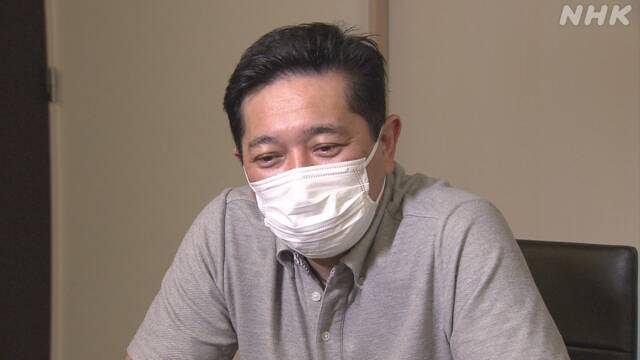The fourth wave, in which even younger generations are becoming more and more severe.
Last month, a 50-year-old man who was infected with a mutant virus and entered the intensive care unit told NHK that he "had a very fast rate of aggravation and realized that it was a scarier disease than I had imagined."
The man is a doctor and usually does not treat patients with the new coronavirus, but last month he had a fever and malaise and underwent a PCR test at his hospital and found that he was infected with the new coronavirus.
I also found that it was a British strain of mutant virus.
After that, I found out that my wife, two children, and the whole family of my parents who lived nearby were infected, so I was treated at home.
However, my symptoms worsened due to headaches and coughing, and two days later I was taken to the hospital by ambulance and hospitalized.
About that time, a man said, "When I was at home and I was sick, I tried to drive to the hospital at first, but in just an hour or two, my condition got so bad that I couldn't move and called an ambulance. I called an ambulance because I knew as a doctor, but I think it would have been the worst result if I worked hard at home. "
After that, the symptoms worsened and the oxygen concentration in the blood decreased.
Since there was a possibility that treatment with a respirator or ECMO would be required, I was transferred to the Hachioji Medical Center of Tokyo Medical University, which has an ICU = intensive care unit.
Men had no chronic illnesses at high risk of aggravation, but the symptoms suddenly worsened.
The man said, "I've seen various illnesses, but I was most surprised that the rate of deterioration was very fast. I thought it might not be possible at this time."
When I entered the intensive care unit, I used my weak fingertips to send a message from my smartphone to my wife, "Maybe it's a little useless. I'm sorry if something happens. Thank you to the children."
In addition to medication, the man was treated with the ICU for eight days, including prone position once every two hours to rest his lung function, and his symptoms improved.
And I was able to leave the hospital on the 21st of last month.
However, he lost about 6 kilograms and lost muscle strength, and he could not walk alone, and he is still suffocating as if his chest was being pressed with strong force.
The man said, "I was conscious of death during treatment, and the damage to my body was great, and I realized that it was a scarier illness than I had imagined."
ICU is full even in Tokyo
Severely ill patients with the new coronavirus, which is rapidly increasing nationwide in the 4th wave.
Even in Tokyo, there are some medical institutions where the ICU = intensive care unit is full.
The Tokyo Medical University Hachioji Medical Center in Hachioji, Tokyo has a total of 66 beds for accepting patients with the new corona virus, of which 6 are secured in the ICU = intensive care unit for critically ill patients.
Until March, there were about two seriously ill patients, but the number has gradually increased and has been almost full since the end of last month.
The bed usage rate of critically ill patients is increasing in Tokyo as a whole, and according to the summary of the Cabinet Secretariat, it is 38% as of the 12th of this month, which exceeds the standard of stage 3.
Until now, most of the patients who were taken to the intensive care unit were elderly people over 60 years old, but in the 4th wave, there were also several seriously ill patients in their 30s to 50s who were younger than that.
This means that some of these younger generations suddenly become severely ill, even though they have no chronic illness.
Dr. Hidefumi Sano of Tokyo Medical University Hachioji Medical Center / Critical Care Center said, "I have been treating the new corona for the past year, but the virus of the 4th wave is particularly infectious, and I live normally without any particular illness. There are many cases in which people who have had the disease become more serious. I feel that it is a terrible disease again, and there is still no definitive treatment, so I think it is time for each person to take strong measures against infection. " ..

